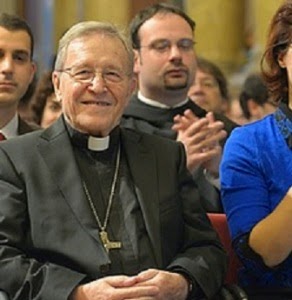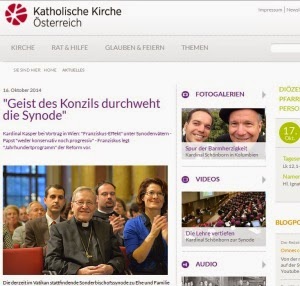Kasper Talks About Pope's "Hundred Year Plan" - Eponymous Flower
Kasper Talks About Pope's "Hundred Year Plan"
(Vienna) This past Wednesday, October 15, 2014, Walter Cardinal Kasper briefly interrupted the more or less obvious destruction within the context of the Synod of Bishops, to lecture at the "dies facultatis" the Catholic Theological Faculty of the University of Vienna on "The keeping of the ecclesiological and ecumenical vision of Pope Francis ".
Although the full text of the lecture is not available, there is a a detailed article published by the Katholiche Austria Press Agency. It has Kasper quoted as saying: "The spirit of the Council is blowing in the Synod." The recent and increasingly bitter remarks about Cardinals Müller and Burke who are opposed, said Kasper, is contrasted instead by the work of the synod, where a climate of "confidence, joy and freedom" is found, which has been shown also in the interim report from last Monday. Kasper tried to play off the history of the Church for Pope Francis, speaking of a pessimistic mood, that is accusing the new Pope of initiating a rupture. In his presentation, the German cardinal described the Holy Father as "God's gift to the Church and this time."
The "Catholic News Agency Austria" writes in its article: "The reform program, which Pope Francis Church had decreed was a '100 year program', said Kasper, since it concerns all dimensions of being church in the attitude of every Christian. Thus, the current choices of rich, according to Kasper, are also far beyond the pontificate of Francis; the success of the Pope [...] therefore depends on whether we will be able to bring the awakening spirit to life in future pontificates." Whether a Catholic can reform his "fundamental beliefs", of course, is highly questionable. The Catholic does not change his fundamentals because the church does not change her basic fundamentals. The Church does not change Her fundamentals, because God does not change. Incidentally, the overbearing Kasperian concept of "100 year program" seems hardly compatible with the Pope's "humble church."
Nevertheless Cardinal Kasper has bandaged the pontificate of Pope Francis with the mood of a "new springtime", so that among the participants in the Synod of Bishops, which comes to an end in a few days, observed the much-touted "Francis" effect. With Francis, a "paradigm shift" has been completed. Accordingly, we could not squeeze him into the "familiar progressive-conservative schema" or determine to assign a "theological school of thought" to him.The "Catholic News Agency Austria" writes: "Rather, it combined elements of tradition in his understanding of the Church with elements 'a ecclesia semper reformanda '- a church that is pushing for change. Francis thus consciously imagines the tradition of the conciliar Popes John XXIII. and Paul VI., who always wanted to re-interpret it in the light of the signs of the times' the unchanging gospel." Pope Francis was a "practical man and of encounter ", referring to the "primacy of reality consists before the idea ".
The German Cardinal even puts the Pope in connection with the widespread Latin American liberation theology. So this was taken up in the liberationist three steps "see, judge, act". At the same time one should not connect Francis with the kind of liberation theology that has been condemned by the Church. Instead, the "Catholic News Agency Austria" says, "the liberation theology of Jorge Mario Bergoglio builds on a special Argentine variant of a theology of the people and culture. These have strong European theological and philosophical roots and a high level of sensitivity to local pieties and regional social situations. Instead of the idea of class struggle, the liberation theology of the Pope was influenced by the idea of reconciliation."
Against this background the other statements made by Cardinal Walter Kasper may be able to be understood by what Francis had in mind with a "participation of the people of God, every individual in the Church." The Church must be therefore primarily, be a church "with an ear to the people." One should not play out the relationship between church doctrine and gospel against each other, says Kasper. This immediately raises the question, why is the Cardinal doing exactly that as regards the indispensable since at least February 2014. Finally, doctrine and gospel is on a line, it's straight and very clear when it comes to adultery. According to Kasper, it constitutes the "joy of the Gospel" the foundation of any "proper understanding of the doctrine." With his evangelical program "Francis seizes the original message of the Church and its mission from the past" - whatever Kasper means by this statement.
Tags:
Views: 72
Replies to This Discussion
© 2025 Created by Dawn Marie.
Powered by
![]()

